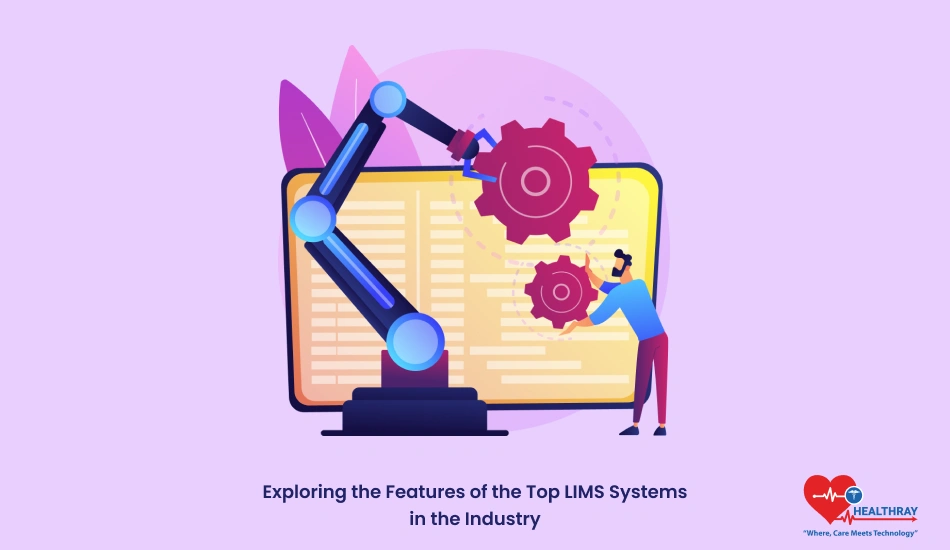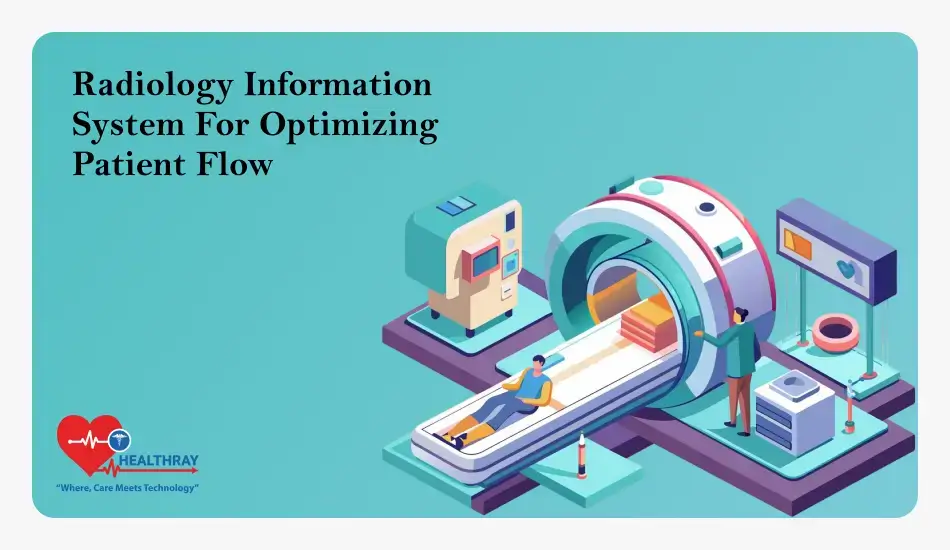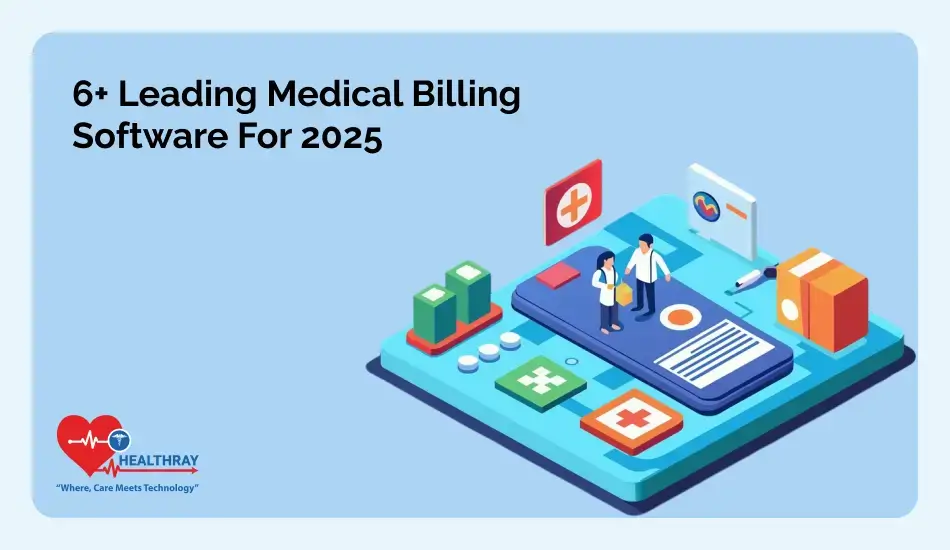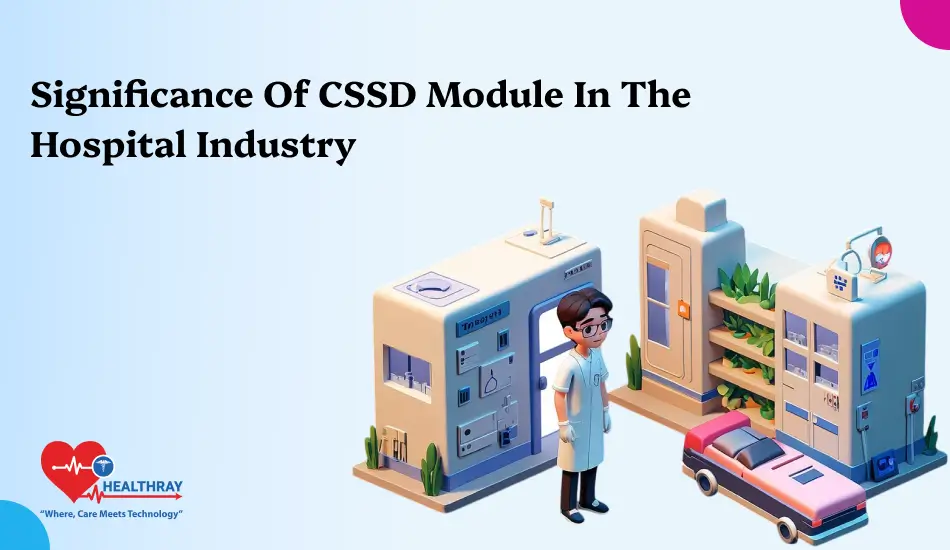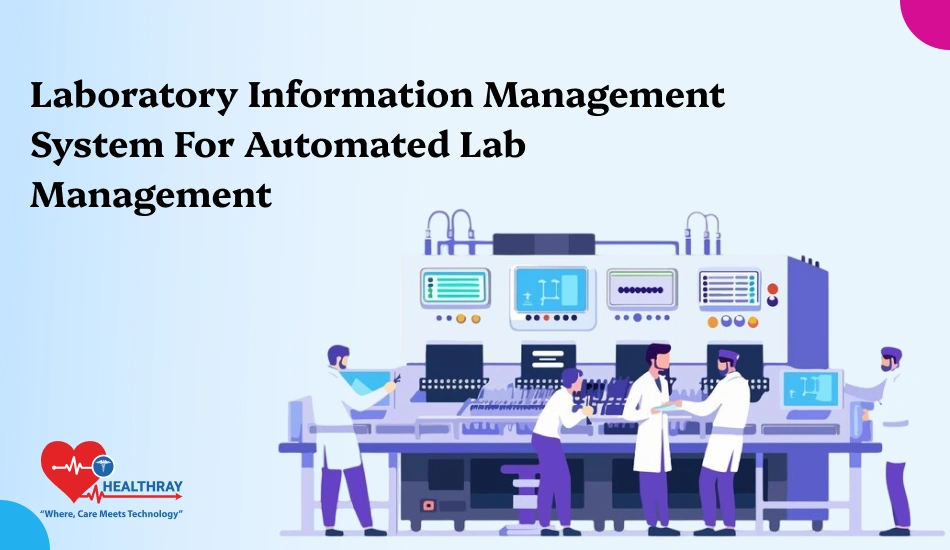Laboratories today are more complex than ever, dealing with enormous amounts of data, stringent regulations, and the need for seamless workflows. This is where Laboratory Information Management Systems (LIMS) come into play. A good LIMS simplifies data management, ensures compliance, and integrates with laboratory instruments to create a cohesive working environment.
But with so many options in the market, it can be overwhelming to choose the right one. This guide dives into the features of the top Laboratory Information Management System in the industry. Whether you’re a lab manager, an IT professional in healthcare, or a biotech researcher, you’ll find insights tailored to your needs.
We’ll explore key features to look for in a LIMS, break down the strengths and weaknesses of popular systems, and help you decide which one fits your lab’s needs best. Let’s get started!
Key Features to Consider in a LIMS
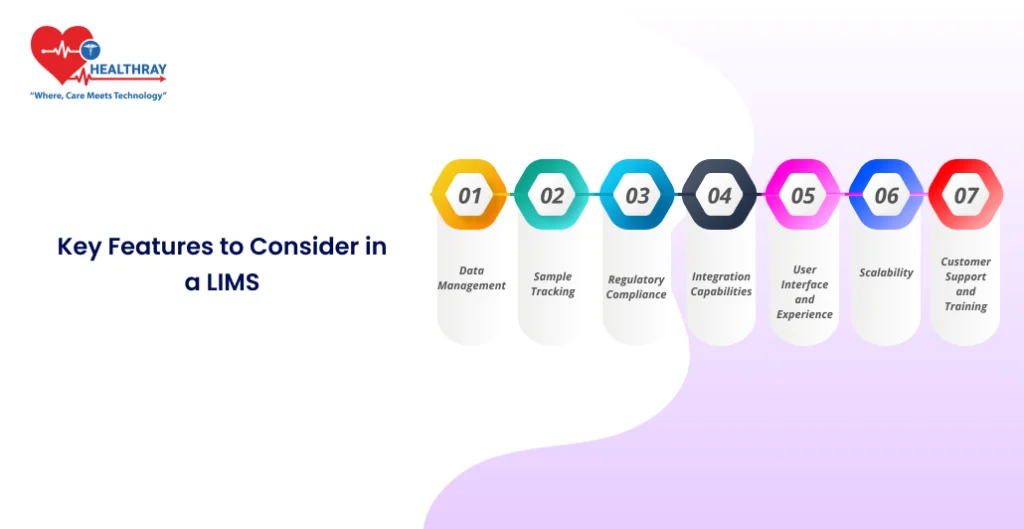
Choosing the right Laboratory Information Management System (LIMS) starts with understanding the features that matter most to your lab. Different labs have unique needs, but certain core functionalities are essential for nearly all users. Here’s a breakdown of the key features you should evaluate when selecting a LIMS.
Data Management
Managing data efficiently is the backbone of any LIMS. The system should organize, store, and retrieve data without a hitch. Features like customizable data fields, real-time data tracking, and centralized storage ensure all your lab’s information stays in one accessible place.
Sample Tracking
A robust LIMS tracks every sample throughout its lifecycle. From the moment it’s logged into the system to when results are reported, you need clear visibility. Barcode integration, chain-of-custody tracking, and automated alerts for delays or errors make managing samples easier and more accurate.
Regulatory Compliance
Labs in healthcare, biotech, and other industries face stringent regulations. A good LIMS helps ensure compliance with standards like ISO 17025, FDA 21 CFR Part 11, and GxP. Features like audit trails, electronic signatures, and automated reporting are crucial for staying audit-ready.
Integration Capabilities
Your LIMS should play well with your lab’s existing tools. Whether it’s laboratory instruments, Enterprise Resource Planning (ERP) systems, or Electronic Laboratory Notebooks (ELNs), seamless integration ensures smooth workflows. Look for systems that offer API support or prebuilt integrations.
User Interface and Experience
A clunky interface can slow down productivity. The best LIMS systems are intuitive, with easy-to-navigate dashboards and minimal learning curves. Features like drag-and-drop functionality, customizable views, and mobile compatibility enhance user experience.
Scalability
As your lab grows, your LIMS should grow with it. Whether you’re handling more samples, adding team members, or expanding into new research areas, a scalable LIMS ensures you won’t outgrow the system. Look for solutions that offer modular add-ons or cloud-based scalability.
Customer Support and Training
Even the most user-friendly LIMS requires onboarding and occasional troubleshooting. Check for customer support options like 24/7 help desks, training programs, and dedicated account managers. A good vendor ensures that your team gets up to speed quickly and stays there.
Top LIMS Systems in the Industry
Now that we’ve covered the key features to consider, let’s dive into some of the top Laboratory Information Management Systems (LIMS) providers. We’ll focus on three standout companies: Healthray Technologies, Bigscal Technologies, and EMRSoftware.Ai. Each of these systems brings unique strengths to the table, tailored to meet diverse laboratory needs.
Healthray Technologies
Healthray Technologies is known for its innovative approach to laboratory data management. Their LIMS is designed to meet the demands of modern labs, with a strong focus on efficiency and compliance.
Key Features:
- Real-Time Sample Tracking: Monitor samples at every stage with detailed audit trails and barcode integration.
- Regulatory Compliance: Preconfigured templates to meet standards like ISO and FDA 21 CFR Part 11.
- Cloud-Based Deployment: Allows labs to access data from anywhere, reducing the need for on-premise infrastructure.
- Customizable Dashboards: Tailored views for lab managers, technicians, and administrators.
Why Choose Healthray Technologies? This system excels in environments where compliance and scalability are critical. Labs handling high volumes of samples will appreciate its robust data management capabilities.
Bigscal Technologies
Bigscal Technologies delivers a user-friendly LIMS Software that combines flexibility with powerful integrations. It’s a favorite among small to mid-sized labs looking for an affordable yet scalable option.
Key Features:
- Instrument Integration: Seamless connection with laboratory equipment and ELNs to streamline workflows.
- Flexible Configurations: Adaptable modules to suit various industries, from biotech to environmental testing.
- Mobile Access: A responsive interface for tablets and smartphones to manage tasks on the go.
- Automated Reporting: Generate detailed reports to meet regulatory requirements with minimal manual input.
Why Choose Bigscal Technologies? If your lab values adaptability and integration without compromising on usability, Bigscal Technologies is a strong contender. It’s ideal for teams seeking a balance between features and budget.
EMRSoftware.Ai
EMRSoftware.Ai stands out for its focus on leveraging artificial intelligence to enhance laboratory workflows. Their LIMS solution is designed for advanced automation and predictive analytics.
Key Features:
- AI-Powered Insights: Predictive analytics to anticipate trends and optimize lab operations.
- Data Security: Advanced encryption and role-based access controls for secure data handling.
- Automation at Scale: Automates routine tasks like sample logging and report generation to save time.
- Scalability: Cloud-based infrastructure that supports both small labs and enterprise-level operations.
Why Choose EMRSoftware.Ai? For labs looking to embrace cutting-edge technology, EMRSoftware.Ai offers advanced features that future-proof operations. It’s particularly suited for research labs that handle complex datasets.
These three companies offer powerful LIMS solutions, each with its own set of strengths. Comparing their features against your lab’s specific needs will help you narrow down the best choice.
Comparison Table: Features of Top LIMS Systems
Here’s a side-by-side comparison of Healthray Technologies, Bigscal Technologies, and EMRSoftware.Ai to help you identify the best fit for your laboratory needs. This table highlights key features and specifications.
| Feature | Healthray Technologies | Bigscal Technologies | EMRSoftware.Ai |
|---|---|---|---|
| Real-Time Sample Tracking | ✔️ Comprehensive tracking with audit trails | ✔️ Barcode-based tracking available | ✔️ AI-enhanced tracking and automation |
| Regulatory Compliance | ✔️ ISO and FDA 21 CFR Part 11 ready | ✔️ Meets industry-specific standards | ✔️ Advanced compliance tools with encryption |
| Instrument Integration | ✔️ Limited API support for integration | ✔️ Seamless integration with ELNs and tools | ✔️ Full-spectrum integration with AI capabilities |
| Cloud-Based Deployment | ✔️ Available | ✔️ Available | ✔️ Highly scalable cloud infrastructure |
| Customizability | ✔️ Customizable dashboards and workflows | ✔️ Highly modular | ✔️ Adaptive AI-driven configurations |
| Mobile Access | ✔️ Limited mobile capabilities | ✔️ Fully responsive mobile interface | ✔️ Advanced mobile interface with analytics |
| Automation | ✔️ Basic automated reporting | ✔️ Routine task automation | ✔️ AI-driven task automation |
| AI and Predictive Analytics | ✖️ Not available | ✖️ Limited | ✔️ AI-powered insights |
| Target Lab Size | Medium to Large | Small to Medium | Medium to Enterprise |
| Support and Training | ✔️ Dedicated onboarding and support | ✔️ Comprehensive training programs | ✔️ 24/7 support with advanced resources |
Summary of Comparison
- Healthray Technologies: Best for medium to large labs needing robust compliance and tracking features.
- Bigscal Technologies: Ideal for small to medium labs prioritizing flexibility and affordability.
- EMRSoftware.Ai: Perfect for labs looking to adopt AI-driven features and advanced automation.
This comparison should make it easier to align your lab’s requirements with the most suitable LIMS provider.
Choosing the Right LIMS for Your Laboratory
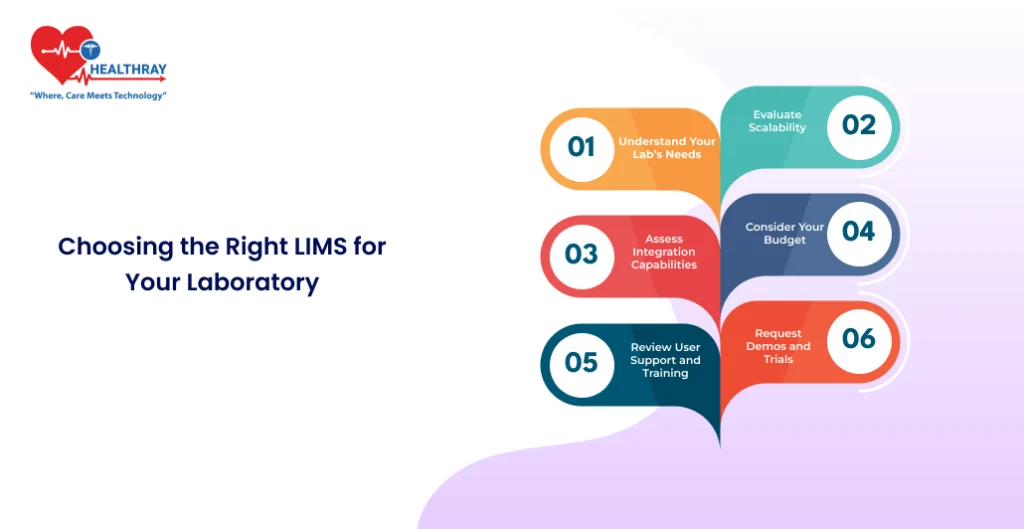
Selecting the ideal Laboratory Information Management System (LIMS) isn’t just about picking the one with the most features. It’s about finding the system that aligns with your lab’s unique requirements, budget, and future plans. Here’s a step-by-step guide to help you make the best choice.
Understand Your Lab’s Needs
Every lab has its own challenges and goals. Start by mapping out what your lab needs most from a LIMS:
- High Sample Volume: Focus on systems with advanced tracking and scalability.
- Regulatory Pressures: Prioritize systems with built-in compliance tools.
- Research and Innovation: Look for AI-driven insights and predictive analytics.
Example: A biotech lab may benefit from the advanced AI features of EMRSoftware.Ai, while a quality control lab might favor the robust compliance of Healthray Technologies.
Evaluate Scalability
Think about your lab’s growth over the next few years. Can the system handle:
- An increase in sample volume?
- Adding more users or locations?
- Expanding into new areas of research or testing?
A system like Bigscal Technologies offers modular scalability, making it a great fit for growing labs.
Assess Integration Capabilities
Seamless integration with your current tools and instruments is non-negotiable. A good LIMS should:
- Connect with laboratory equipment.
- Sync with ELNs and ERP systems.
- Provide API support for custom integrations.
Pro Tip: If your lab already uses a variety of software, choose a system with proven compatibility, like Bigscal Technologies or EMRSoftware.Ai.
4. Consider Your Budget
Cost is a major factor. However, don’t just look at the initial investment. Factor in:
- Long-term costs for scaling.
- Training and onboarding expenses.
- Subscription or maintenance fees.
While Bigscal Technologies may be cost-effective for smaller labs, larger organizations might find Healthray Technologies or EMRSoftware.Ai worth the investment for their advanced features.
Review User Support and Training
A smooth onboarding process and ongoing support can save your team from frustration. Look for:
- 24/7 customer service.
- Tailored training programs.
- Dedicated support teams for troubleshooting.
Example: EMRSoftware.Ai offers comprehensive support, making it ideal for labs adopting complex AI-driven workflows.
Request Demos and Trials
Most LIMS providers offer free trials or product demos. Use these to:
- Test user interfaces.
- Evaluate speed and functionality.
- Get feedback from your team.
Conclusion
Choosing the right Laboratory Information Management System (LIMS) can transform your lab’s operations. From streamlining data management to ensuring regulatory compliance and automating routine tasks, the right system can save time, reduce errors, and improve overall efficiency.
This guide highlighted the top contenders—Healthray Technologies, Bigscal Technologies, and EMRSoftware.Ai—each catering to different needs. Whether your focus is on compliance, cost-effectiveness, or advanced AI features, these solutions offer something for every lab.
Before making a decision, assess your lab’s specific requirements, evaluate scalability, and take advantage of demos or trials. Remember, a well-suited LIMS is an investment in the future efficiency and success of your lab.
